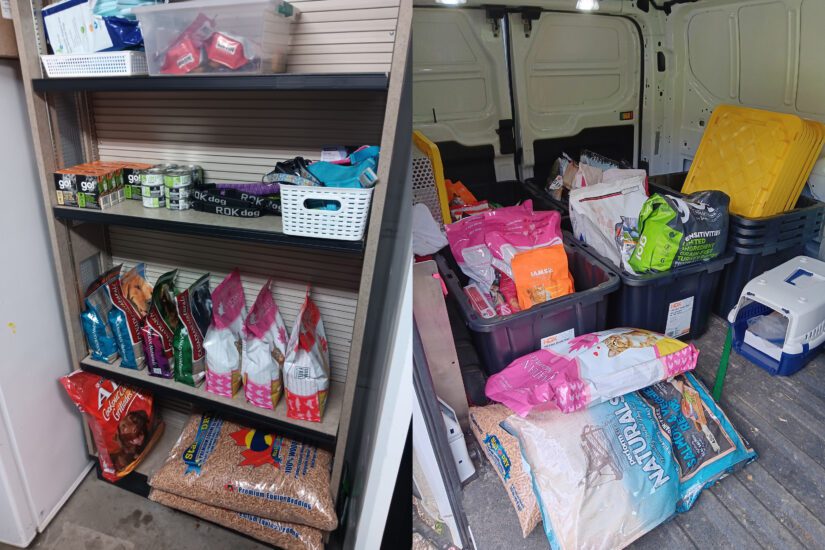The BC SPCA’s pet food bank is seeing a huge increase in demand for specialized diets through their community animal care centres and pet food bank partners this year.
“The challenge with specialized diets is that they are more expensive than traditional pet food and much less likely to be donated because of that,” says Diane Waters, the BC SPCA’s outreach specialist. “It certainly has had an impact on our budget. We simply don’t get enough food donations to meet the demand.”
“Veterinarians will sometimes recommend a special diet for animals with allergies and other medical issues like kidney disease to help maintain their health,” says Dr. Rachel Groarke, the BC SPCA’s manager of shelter medicine. “These specialized diets play an important role in keeping the animal healthy and may help in preventing issues that require veterinary intervention.”
Waters says, “We have a client who accesses the pet food bank to help get the urinary care cat food she needs for her pet. Feeding her cat this food helps prevent urinary problems and helps her avoid having to bring the cat in for veterinary care.”
Waters adds, “With everyone’s budgets so tight these days, being able to provide this food can make a huge difference and can help keep a pet with a family.”

The BC SPCA works in other ways to help keep pets with their guardians. One of their most successful partnerships has been with BC Housing.
“In March 2024, I partnered with Diane Waters at the BC SPCA to launch a monthly Pet Food Bank at MacLean Park, addressing the needs of our tenants with pets,” says Logan Armstrong, Tenant Support Worker, Housing and Health Services, BC Housing. “Since then, the program has grown into a heartwarming community hub, where tenants not only access essential pet supplies, but also share stories and build connections. The program has alleviated financial stress for many and fostered a greater sense of belonging and engagement, creating a supportive atmosphere that extends beyond the Pet Food Bank itself.”
One of the monthly pet food bank clients is Jo. “Like many in BC Housing, I have a very small income,” she says. “As a responsible pet owner, I ensure my cat, Prudence, has food, litter, and vet care. Because of the program, I have never had to buy dry food which helps my budget tremendously. I can use the saved money to buy her more wet food and toys.”

Jo adds, “Some think low-income people shouldn’t have pets because we’re poor, but life is tough right now and having a pet to come home to and love makes everything easier,” she says. “The people I know would rather go without food than not feed their pet. By hosting these events, the BC SPCA shows that it is perfectly acceptable.”
The BC SPCA’s pet food bank program works with food bank partners and organizations across the province to help support pet guardians who are having trouble making ends meet in a challenging economy. In addition to these partnerships, each one of the BC SPCA’s community animal centres have pet food and supplies available to anyone who needs it.
Waters says the BC SPCA welcomes donations of unopened pet food for community food banks. Cash donations help the BC SPCA buy food and supplies.
Thanks to the Goudge Family Foundation and an anonymous animal-lover, every gift to support outreach services will be tripled, up to $40,000.
This match has now been met – thank you so much for all the kind generosity!
